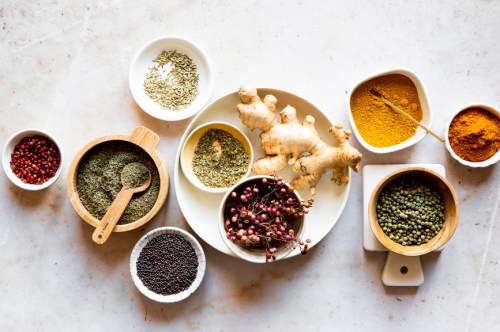Dealing with an uncomfortable bout of constipation? The solution might be hidden in your spice rack, says Sarah Robbins, MD, FRCPC, a gastroenterologist, gut health expert, and the Founder of Well Sunday. In fact, according to the gastroenterologist, a dash of cayenne pepper and a sprinkle of cinnamon are a few of the best spices that make you poop.
Experts in This Article
registered dietitian and owner of BZ Nutrition
board-certified gastroenterologist and founder of Well Sunday
registered dietitian and author of The Better Period Food Solution.
So, if you’re looking to find relief from constipation fast, you may want to stock up on these essential ingredients that keep things moving steadily (if you know what we mean). Ahead, we’re delving into the top 12 spices for gut health to eat when constipated to ensure you’re ready when *duty* calls.
What causes constipation?
According to Dr. Robbins, constipation is a common digestive issue that can be caused by one or a combination of three main factors: diet and lifestyle, medical conditions, and medications. Understanding these factors can help you and your health-care provider pinpoint the cause of your constipation and how best to address it.
1. Diet and lifestyle
Dr. Robbins explains that dietary and lifestyle factors are the most common reasons for constipation. They include:
- Low fiber intake: Diets low in fiber from fruits, vegetables, whole grains, and legumes are a common cause for constipation. Fiber helps to bulk up and soften stool, making it easier to pass.
- Inadequate fluid intake: Dehydration and constipation go hand in hand. Insufficient water and fluid intake can lead to harder, drier stools that are difficult to pass.
- Excessive dairy or processed food consumption: Overconsumption of foods that cause constipation, like dairy products and heavily processed foods (both of which are typically low in fiber), can contribute to poor bowel movements.
- Physical inactivity: Lack of regular exercise can decrease the motility of the digestive system, leading to constipation.
- Routine disruption: Changes in daily routine, such as travel or altered eating and sleeping patterns, can affect bowel regularity.
2. Medical conditions
Dr. Robbins says that certain medical conditions can cause constipation or make people more prone to it. Some examples include:
- Gastrointestinal disorders: Constipation is often a symptom of gut health issues like irritable bowel syndrome (IBS), colorectal cancer, or anatomical problems such as intestinal obstructions.
- Neurological disorders: Diseases like Parkinson’s disease, multiple sclerosis, and spinal cord injuries can impair the nerves control bowel muscle function, leading to constipation and other gut issues.
- Endocrine and metabolic disorders: Hypothyroidism1, diabetes2, and hypercalcemia (where you have high calcium levels in the blood) can slow down bowel movements.
- Pregnancy: Hormonal changes and the physical pressure of the uterus on the intestines can lead to constipation during pregnancy3.
3. Medications
Some medications might cause constipation. If you’re worried about this, check the drug label facts and talk to your doctor about how to manage it. The following drug classes often cause constipation:
- Opioids: This class of pain medication can slow movement of stool through your bowels4, which is why doctors often prescribe laxatives when administering opioids.
- Anticholinergics: This type of drug blocks a specific type of neurotransmitter, and is used to treat a variety of diseases including Parkinson’s disease. Constipation can be a side effect.
- Antidepressants: Some (but not all) can inhibit bowel movements5.
- Calcium channel blockers: Used for heart conditions and high blood pressure, and can cause constipation.
- Iron supplements: Can lead to gastrointestinal upset and constipation.
12 spices that make you poop and help relieve constipation
1. Cayenne pepper
Gastroenterologist Niket Sonpal, MD, recommends cayenne pepper for his patients that have a lot of indigestion. “Cayenne stimulates the taste buds, which in turn stimulates saliva production,” Dr. Sonpal says. “Then, moving on down the digestive tract, cayenne stimulates three more things: hydrochloric acid secretion in the stomach, pancreatic enzymes from the pancreas into the small intestines, and bile secretion from the liver and gall bladder. All three chemicals help digestion and help patients feel less bloated after meals.” He suggests slipping it into some lemonade for an extra kick—and some gut-boosting benefits. Ahem, did someone say, what is Tajín? IYKYK.
2. Ginger
“Ginger is great for your health overall as helps boost your immunity, but it’s particularly great for gut health because it can promote motility through your digestive tract, helping you go to the bathroom more easily to fight constipation and bloat,” says Brigitte Zeitlin, RD, owner of BZ Nutrition in NYC . “It also works to relieve gut irritation.” Zeitlin recommends drinking ginger as a tea, adding it to your smoothies, or copying her trick and asking for double ginger on the side with your go-to sushi order.
3. Cumin seeds
“Cumin can help with bile production, which is what your body needs to break down fat so that your body can digest and absorb it,” Zeitlin says. “When your body has a hard time breaking down fat, you can feel sluggish and bloated.” Read: Constipated AF. Cumin is often found in curries and in taco seasoning; if you’re looking to test out a combo of spicy and sweet, cumin honey is now the thing to try.
4. Fennel seeds
“Fennel seeds have been linked to promoting a healthy gut by fighting against the bad bacteria that can build up in the gut and cause indigestion and discomfort,” Zeitlin says (and promoting healthier BMs). She suggests sprinkling some on top of your stir-fry and soups.
5. Turmeric
For Dr. Sonpal, turmeric is one spice he simply can’t live without. “For me personally it’s something I take daily—in cooking as well as a supplement,” he says. “Besides being lauded for its natural anti-inflammatory spice properties, turmeric is a natural laxative. A [small] study in Japan found that volunteers who eat food with turmeric6 have a faster bowel transit time, which in turn means less constipation.” So, know that your golden milk latte is MD-approved in more ways than one.
6. Cinnamon
The perfect gut-friendly coffee mix-in, cinnamon is one of Dr. Robbins’ favorite spices for constipation. “This spice is not only great for flavoring, but also helps stimulate digestion and relieve constipation,” she says. The spice also has impressive anti-inflammatory benefits.
7. Cardamom
Fragrant and delicious, Dr. Robbins says cardamom is another digestion superhero that can help with gassiness. “Often used in Ayurvedic medicine, cardamom can help with digestion and is known to relieve flatulence, which can ease constipation,” she says. Plus, it’s a great way to use more of this ingredient, consider spices do expire faster than you may think.
8. Black pepper
Chances are you’re already cooking with this spice regularly, which is great news considering Dr. Robbins says it’s loaded with digestion-boosting perks. “It stimulates the digestive tract and increases the secretion of hydrochloric acid in the stomach, which helps in digesting food more efficiently,” she says. Better digestion, and you’ll have a better chance at fighting constipation.
9. Coriander
Coriander (aka the dried, seed version of the fresh herb, cilantro) helps with keeping *things* flowing steadily. “Ground coriander is used for its digestive benefits, as it can help stimulate the intestines to promote bowel movements,” Dr. Robbins says.
10. Nutmeg
Moderation is key when it comes to nutmeg consumption, since it can be poisonous7 in large quantities. However, Dr. Robbins says that this spice, in small doses, can act as a natural remedy for indigestion and constipation.
11. Anise
Anise contains several key compounds (like flavonoids, malic acid, and caffeic acid) that help support healthy digestion. “Anise seeds contain compounds that can help relax the digestive tract and relieve constipation,” Dr. Robbins says.
12. Licorice root
Dr. Robbins says licorice root is a great entry point into the world of spices that make you poop. “This is used to treat gastrointestinal problems including constipation due to its gentle laxative effect,” Dr. Robbins says.
Which spice is best for constipation?
The best spice for constipation is technically an herb: senna. “Senna is an herb known for its strong laxative effect that’s widely recognized and clinically used to treat constipation,” Dr. Robbins says. “It functions by stimulating intestinal peristalsis and altering water and electrolyte transport in the colon8. This effect is well-documented in studies and recognized by health authorities including the FDA,” she says.
In full transparency, Dr. Robbins explains that “if we were to compare the effectiveness based on peer-reviewed scientific literature, none of the spices listed matches the efficacy of more conventional herbal treatments like senna, specifically for constipation.” However, that’s not to say that these spices won’t help you poop; there’s just more research to back herbs like senna (for now).
Dr. Robbins adds that although senna is effective, it should be “used with caution as it can cause dependency if used regularly over a long period.” It should only be used on a short-term basis and as directed on the package label or by your health-care provider.
In addition to senna, Dr. Robbins also recommends a few other herbs for constipation:
- Cascara Sagrada: Similar to senna, cascara sagrada is another herb that acts as a stimulant laxative. It also contains anthraquinones9 and is typically recommended for short-term constipation relief.
- Psyllium: Although more of a fiber supplement than a traditional herb, psyllium is derived from the seeds of the Plantago ovata plant. It absorbs water in the gut to help soften stools and promote regularity. It’s considered a bulk-forming laxative and is very effective for chronic constipation.
- Rhubarb: The root of the rhubarb plant has a strong laxative effect due to its high anthraquinone content. It works similarly to senna and cascara sagrada, and is often used in traditional Chinese medicine.
- Aloe vera: Aloe vera is well-known for its soothing properties for the skin, but it also has uses as a digestive aid. The latex of the aloe plant contains anthraquinones, specifically barbaloin10, which have laxative effects.
- Dandelion: The root of the dandelion plant is often used as a mild laxative and to stimulate digestion. It has a gentle action and is also known for supporting liver function.
When to seek the help of a medical professional
Whether you choose to supplement your diet with spices or herbs to aid digestion, they should be used appropriately, and always in moderation, says Dr. Robbins. “More potent treatments should be considered for severe or chronic constipation under the guidance of a health-care professional,” she says. It’s also important to note that although generally safe, at-home remedies for treating constipation can have a few side effects. For example, Dr. Robbins explains that spices can trigger allergies, interact with certain medications, and be harmful in excessive amounts. As such, it’s important to seek the help of a medical professional if symptoms worsen or when in doubt.
Learn more about ginger’s major health benefits:
—reviewed by Jennifer Logan, MD, MPH
Bennett, William E Jr, and Robert O Heuckeroth. “Hypothyroidism is a rare cause of isolated constipation.” Journal of pediatric gastroenterology and nutrition vol. 54,2 (2012): 285-7. doi:10.1097/MPG.0b013e318239714f
↩︎Prasad, V G M, and Philip Abraham. “Management of chronic constipation in patients with diabetes mellitus.” Indian journal of gastroenterology : official journal of the Indian Society of Gastroenterology vol. 36,1 (2017): 11-22. doi:10.1007/s12664-016-0724-2
↩︎Trottier, Magan et al. “Treating constipation during pregnancy.” Canadian family physician Medecin de famille canadien vol. 58,8 (2012): 836-8.
↩︎Kelly, Karen et al. “Toward achieving optimal response: understanding and managing antidepressant side effects.” Dialogues in clinical neuroscience vol. 10,4 (2008): 409-18. doi:10.31887/DCNS.2008.10.4/kkelly
↩︎Bassotti, G et al. “Nifedipine and verapamil inhibit the sigmoid colon myoelectric response to eating in healthy volunteers.” Diseases of the colon and rectum vol. 41,3 (1998): 377-80. doi:10.1007/BF02237495
↩︎Shimouchi, Akito et al. “Effect of dietary turmeric on breath hydrogen.” Digestive diseases and sciences vol. 54,8 (2009): 1725-9. doi:10.1007/s10620-008-0550-1
↩︎- ↩︎
Rao, Satish S C, and Darren M Brenner. “Efficacy and Safety of Over-the-Counter Therapies for Chronic Constipation: An Updated Systematic Review.” The American journal of gastroenterology vol. 116,6 (2021): 1156-1181. doi:10.14309/ajg.0000000000001222
↩︎Lombardi, Niccolò et al. “Association between anthraquinone laxatives and colorectal cancer: protocol for a systematic review and meta-analysis.” Systematic reviews vol. 9,1 19. 24 Jan. 2020, doi:10.1186/s13643-020-1280-5
↩︎Patel, D K et al. “Barbaloin: a concise report of its pharmacological and analytical aspects.” Asian Pacific journal of tropical biomedicine vol. 2,10 (2012): 835-8. doi:10.1016/S2221-1691(12)60239-1
↩︎
Sign Up for Our Daily Newsletter
Get all the latest in wellness, trends, food, fitness, beauty, and more delivered right to your inbox.
Got it, you've been added to our email list.











